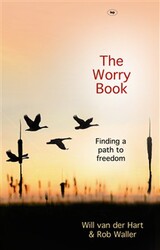Future Orientation
George Bernard Shaw said that two things in life are certain - death and taxes. Actually, he could have covered both of these with one idea - the future. Even as you read this, you have moved into the future and unless we are Time Lords like Dr Who we are going to spend the rest of our lives doing this.
But, given that every good thing has a bad side, how can thinking about the future go wrong, and how can we redeem that which God has given to us?
Over-burdened
In a blog like this on mental health, I have to start with worry. Corrie Ten Boom once said that "worry does not empty tomorrow of it's pain, it only robs tomorrow of it's joy". People who are anxious, and more specifically those who churn and churn in a chronic manner about the future, will find it hard to think about tomorrow or the day after tomorrow without a sense of enjoyment. Holidays become challenges and they are not planned. Or if planned, then to the n-th degree so the joy is lost. Worry is a desire to control that which is probably uncontrollable.
Related but different is Post Traumatic Stress Disorder. Here a past trauma is continually re-experienced as if it is about to happen in the future and so evasive action must be taken. Sometimes this is just for one problem, but it tends to generalise and mean the future in general can cloud - even to the point that the person can become clinically depressed. Add to this that the person is aware of the illogicality of this, and they can have aright good go at themselves. Depression now very likely.
Over-visioned
Some people on the other hand seem to never stop talking about the future in a totally positive light. The world is full of potentials and sadly the only things stopping these potentials from being realised is the numpties around them. I spoke with a journalist last week about the problems of spiritual abuse in churches led by such a pastor, but this is not isolated to the church. "Office"-style micromanagement in many companies and jobs can be just as damaging.
The really frustrating thing is that these "visionaries" haven't taken into account the bigger picture. There are well defined trends - such as the digital revolution, the g-localisation agenda and the east-west reversal - which are coming to us [unless Jesus returns, d.v. etc...] yet are not factored into these amazing visions. Result - vision falls flat on its face and people get hurt.
For an informed view of the future, have a look at the website of Dr Patrick Dixon, Christian, one-time medical doctor and 'futurologist' - sounds weird, but this guy is good [and helpful].
Hope-fully engaged
However, no thoughts on the future would be complete without a mention of the guy who knows it all. In fact, I sometimes think it is better to think of God standing at the end of time and kind of sucking it all towards him, maybe with a giant vacuum cleaner [or is that just me!?]. But my point is that He knows. He knows, and He is good is ne not?
Just because He knows doesn't mean that we should know or that we will tell us, despite what the local prophet or divine will tell you. God is sovereign and therin lies our ability to trust him for he is not a puppet we can demand to perform. When describing Aslan, the great lion in Narnia, Tumnus the fawn says, "He's not a tame lion, but he IS good." The future maybe unknowable, but it is not unknown.
A book to tell you more
 All of this is also a long winded way to tell you that Will Van Der Hart and have co-written a book on worry, published by IVP. I have had numerous gags along the line of "are you worried about undertaking a venture like this." The short answer is that I am not, because I have done what I can with the things I can change, and I have decided not to worry about the things I cannot - and I have learned to tolerate the uncertainly of not knowing. More on this in the book!
All of this is also a long winded way to tell you that Will Van Der Hart and have co-written a book on worry, published by IVP. I have had numerous gags along the line of "are you worried about undertaking a venture like this." The short answer is that I am not, because I have done what I can with the things I can change, and I have decided not to worry about the things I cannot - and I have learned to tolerate the uncertainly of not knowing. More on this in the book!
SEE THE WORRY BOOK NOW
Rob Waller, 06/08/2010